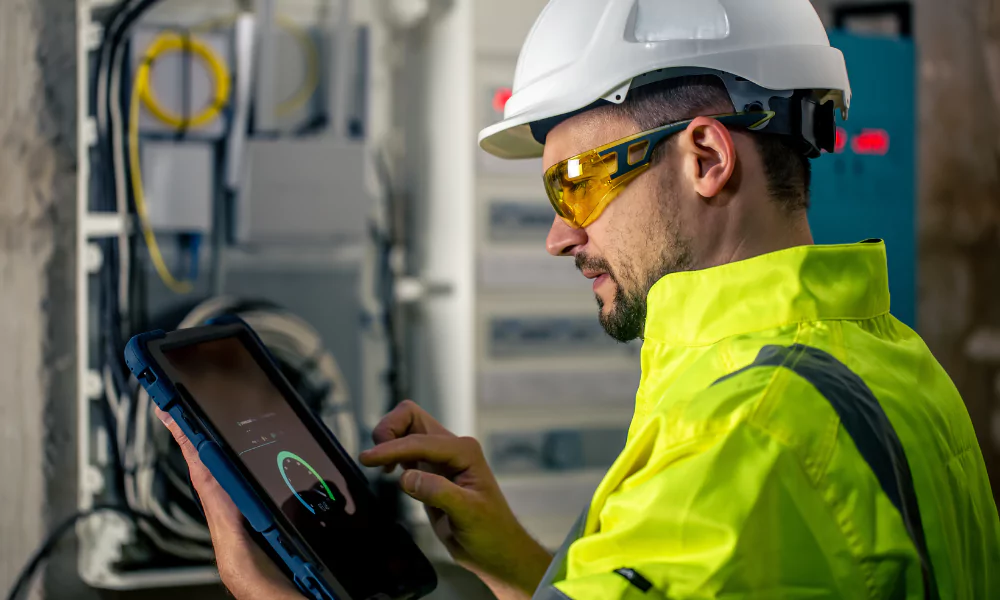
RFID technology is transforming the oil and gas industry by reshaping operations, enhancing safety and delivering cost-effective solutions across the entire sector. We will see how RFID is enabling innovation and how the energy sector can leverage this technology. RFID continues to deeply impact the energy and utilities industry and the oil and gas industry at large. In recent years, price and demand in both of these have increased and so has their value. This has resulted in visibility and traceability benefits.
According to McKinsey, without a fundamental evolution in the way oil and gas firms approach digitisation in everything from operations to maintenance in logistics, ideal industry performance will become nearly impossible to achieve.
So, let’s see a high-level overview of what this innovation looks like.
Also Read: RFID Tag Uses – The Complete Guide, Benefits, and More in 2023
5 Reasons Why the Energy and Utilities Industry Need RFID Technology
The oil and gas industry has intricate operations and high-risk environments. In that case, the introduction of RFID technology on the floor will greatly improve operational efficiency. So, let’s see five solutions that RFID brings to this industry.
1. Enhanced Safety Measures
This industry cannot compromise on safety. Therefore, with RFID technology, they can monitor and manage safety equipment and personnel; By equipping workers with RFID tags, companies can ensure that they have real-time tracking. It is a proactive approach to guarantee safety and improve emergency response times.
2. Streamlined Asset Tracking
Asset management is a crucial aspect of the oil and gas industry. This involves oversight of valuable machinery and tools and equipment. RFID tags simplify the tracking of assets across multiple locations offer real-time visibility and reduce the likelihood of loss or misplacement. It saves both costs and time.
3. Improved Supply Chain Management
The intricate nature of the supply chain within the oil and gas sector demands a sturdy management framework. RFID solutions streamline material tracking from inception to delivery, ensuring transparency and efficiency across the supply chain. This enhanced visibility minimises delays, optimises inventory levels, and improves operational flow.
4. Increased Operational Efficiency
Time is very important in the oil and gas sector where operational delays can lead to heavy financial losses. RFID technology streamlines processes from asset tracking to maintenance scheduling thereby enhancing operational efficiency.
5. Compliance and Documentation
Compliance with industry regulations and standards is a critical requirement for the oil and gas industry. RFID technology ensures compliance with regulatory standards. Automated record-keeping reduces human error provides audit trails and facilitates easy access to compliance thereby ensuring transparency and accountability.
RFID Use Cases for the Energy and Utilities Industry
RFID technology is remarkably versatile in the energy and utilities industry. It offers tailored solutions for various tracking challenges. So, let’s see a few of these several use cases and highlight specific applications for each one.
1. Optimising and Automating Drilling
Using RFID tags on drilling equipment, companies get to monitor the status and location of their assets in real-time. This helps them to streamline drilling operations, reduce downtime and minimise expensive equipment maintenance. Not just that it has other purposes as well:
Asset Tracking: RFID tracking in the energy and utilities industry allows for precise tracking and monitoring. This ensures that assets are efficiently allocated to drilling sites and that people follow maintenance schedules to prevent unexpected breakdowns.
Safety Enhancements: RFID technology can monitor the movement and location of personnel on drilling rigs, enhancing safety protocols. In case of emergencies, RFID-enabled personnel tracking systems can quickly locate and evacuate workers.
2. Product Automation
RFID is revolutionising production processes for upstream firms in the oil and gas industry by automating key tasks and improving overall efficiency. This technology can help in automating:
Quality Control: By attaching RFID tags to containers and tanks, equipped with temperature and environmental sensors, oil companies can collect real-time data on crucial parameters like temperature, pressure and humidity that affect oil quality.
There is wireless data transmission to a central monitoring system, which triggers alerts if any deviations from acceptable ranges happen. With RFID companies cannot only ensure the integrity of their oil products but also enhance traceability, compliance and ability to take proactive measures when there is a quality issue.
Learn more-Understanding RFID, RFID Tags, and RFID Operating Ranges
Inventory Management: RFID tags on energy and utilities industry equipment like pumps, valves and compressors help in real-time management. This ensures that the right resources are available when needed, reducing downtime.
3. Enhanced Field Operations
Field operations in the oil and gas industry significantly benefit from RFID technology, especially when it comes to:
- Worker Safety: RFID-enabled personal protective equipment (PPE) and safety gear ensure that workers have adequate equipment that they can quickly load in case of emergencies.
- Maintenance Alerts: IoT-based smart energy metres with RFID tags can work as seniors on critical equipment; they automatically generate maintenance alerts based on usage and wars, ensuring that field operation continues smoothly and avoids costly breakdown.
4. Digitally Enabled Logistics
RFID is transforming logistics for upstream firms by providing real-time visibility into how the goods and materials move. They are doing this specifically when it comes to:
Supply Chain Visibility: RFID tags for shipments and containers of energy and utility industry allow companies to track their location and even the condition of the materials. This improves delivery accuracy and reduces the risk of theft or loss.
Optimised Routing: RFID data can optimise transportation routes, and reduce fuel consumption and emission which aligns with sustainability goals.
5. Smart Maintenance
RFID for the energy and utilities industry helps in predictive maintenance. This is a game changer for the oil and gas industry. It allows:
- Equipment Visibility: An industrial RFID tag reader and sensor on critical equipment can continuously monitor the location, condition and operation status of each asset in real-time. This means the operators can effortlessly distinguish between equipment actively deployed in their field and equipment in reserve.
This enhanced visibility ensures that the equipment is optimally allocated, preventing unnecessary duplication of assets.
- Pressure Quantification: RFID sensors can quantify pressure changes in pipelines, valves and storage e tanks. Companies tend to use high-temperature RFID tags for industrial environments. By collecting and analysing pressure data in real-time, companies can easily detect anomalies and leaks promptly. This makes it an invaluable tech for preventing accidents, minimising environmental impacts and ensuring the safety of both personnel and assets.
- Shifting from Time-Based Inspections to Utility-Based Inspections: Utilisation-based inspection in the tracking energy industry replaces time-based methods, allowing maintenance when necessary. RFID sensors track equipment usage, wear, and potential failures, reducing costs, and downtime, and enhancing operational efficiency.
6. Asset Tracking and Traceability
As stated before, the RFID tags give the firms a granular level of visibility into their inventory. These tags have unique identifiers that enable constant monitoring of assets’ movements within facilities or vast operational areas. The real-time tracking ensures that labels are always accounted for, reducing the risk of misplacement or loss.
Not just that RFID tags can also-
- Record the history of the asset usage and maintenance. This helps in a traceability trail that is invaluable for compliance purposes such as optimising maintenance schedules.
- Since equipment downtime could lead to substantial financial losses, the ability to track assets in real-time and make data-driven decisions is a game changer. This ensures efficient allocation of resources and smooth running of operations.
RFID’s asset tracking capabilities extend beyond the physical aspects. They also help to track and manage digital assets. Such a holistic approach equips oil and gas companies with the tools they need to maintain operational excellence. With this, they can gain a competitive edge in an ever-evolving energy and utilities industry.
FAQs: RFID Solutions for the Energy and Utilities Industry
How does a prepaid energy metre using RFID work?
RFID reader reads a valid RFID card and activates the power metre so that it can supply electricity. When the credit is low or cut off, the registered user will receive a message.
What is the role of RFID tags for oil pipelines?
It can monitor the status of the equipment in the field These RFID tags can provide information on a specific pipe’s ID number, age, length, usage, underground temperature, flow rate, and mud composition.
What are the three types of RFID tags?
You can divide the RFID tags into three categories based on the range of frequencies they use to communicate data: low frequency (LF), high frequency (HF) and ultra-high frequency (UHF).
Conclusion
RFID solutions represent more than just a passing trend in the oil and gas sector’s evolution. They signify a pivotal shift towards enhanced efficiency, safety, and compliance. Embracing RFID technology solutions from Qodenext for the energy and utilities industry addresses present and future challenges confidently, fostering sustainable growth and operational excellence.


